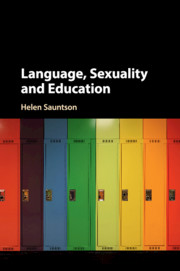Book contents
- Language, Sexuality and Education
- Language, Sexuality and Education
- Copyright page
- Dedication
- Contents
- Figures
- Tables
- Acknowledgements
- Introduction
- 1 Confronting the Context
- 2 Researching Language and Sexuality in Educational Settings
- 3 Using Sociolinguistic Frameworks to Explore the School Experiences of LGBT+ Youth
- 4 Educators’ Perspectives on Language and Sexual Diversity in Schools
- 5 Exploring Ideologies of Sexuality in Curriculum Documents
- 6 SRE Classroom Interaction Analysis and the Construction of Sexual Identities
- Closing Remarks
- References
- Index
3 - Using Sociolinguistic Frameworks to Explore the School Experiences of LGBT+ Youth
Published online by Cambridge University Press: 26 February 2018
- Language, Sexuality and Education
- Language, Sexuality and Education
- Copyright page
- Dedication
- Contents
- Figures
- Tables
- Acknowledgements
- Introduction
- 1 Confronting the Context
- 2 Researching Language and Sexuality in Educational Settings
- 3 Using Sociolinguistic Frameworks to Explore the School Experiences of LGBT+ Youth
- 4 Educators’ Perspectives on Language and Sexual Diversity in Schools
- 5 Exploring Ideologies of Sexuality in Curriculum Documents
- 6 SRE Classroom Interaction Analysis and the Construction of Sexual Identities
- Closing Remarks
- References
- Index
Summary
- Type
- Chapter
- Information
- Language, Sexuality and Education , pp. 50 - 92Publisher: Cambridge University PressPrint publication year: 2018



